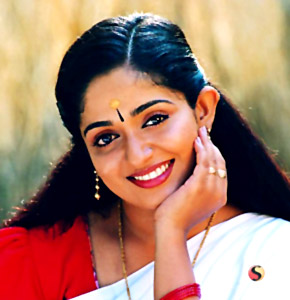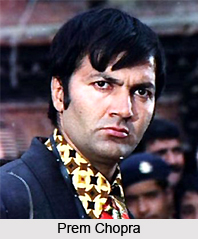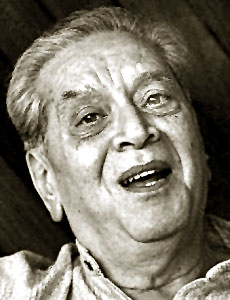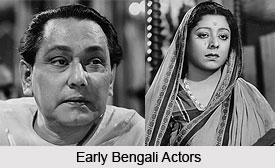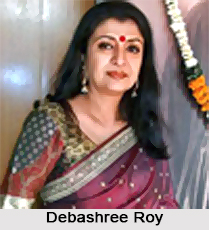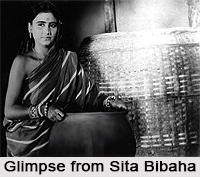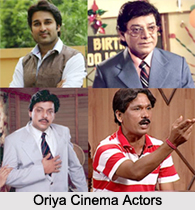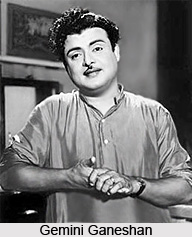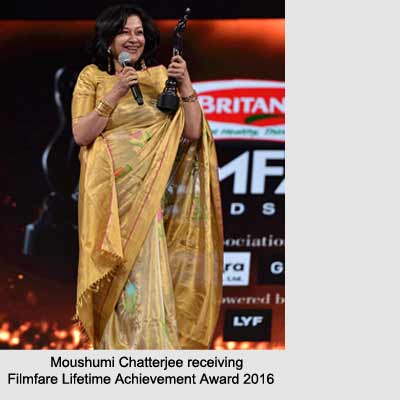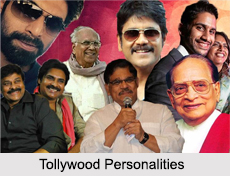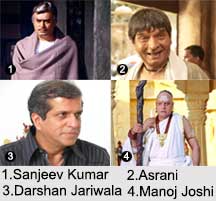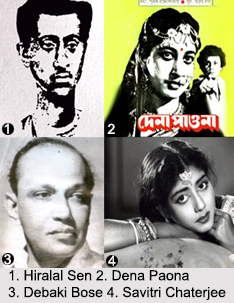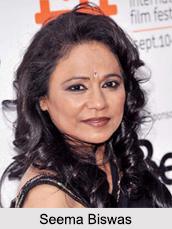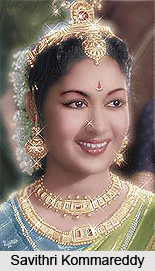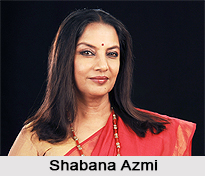 Satyajit Ray, the legendary filmmaker of India, describing her performance in `Ankur`, has noted: "in Ankur she may not have fitted immediately into her rustic surroundings, but her poise and personality are never in doubt. In two high-pitched scenes, she pulls out the stops to firmly establish herself as one of our finest dramatic actresses". One of the leading actresses of parallel cinema is also a social activist. She is the resurgent face of feminism of modern India and she is equally acclaimed for her brilliance on the celluloid.
Satyajit Ray, the legendary filmmaker of India, describing her performance in `Ankur`, has noted: "in Ankur she may not have fitted immediately into her rustic surroundings, but her poise and personality are never in doubt. In two high-pitched scenes, she pulls out the stops to firmly establish herself as one of our finest dramatic actresses". One of the leading actresses of parallel cinema is also a social activist. She is the resurgent face of feminism of modern India and she is equally acclaimed for her brilliance on the celluloid.
Shabana is one of the rare few in the public limelight, who have not got caught up in the magic web of a larger than life image. Obviously, she has found much meaning in life, than her mere public image, where she carries herself with poise and dignity.
Shabana Azmi was born on 18th September 1950 to poet-activist, the legendary Kaifi Azmi and Shaukat, a well-known stage actress. Apparently she has inherited a lot of talent and intellect from her parents. Her parents had an active social life, and their home was always throbbing with people and activities. The environment at their home implanted into her a respect for family ties, social and human values; a support from her parents was always there to develop a passion for intellectual stimulation and growth. Baba Azmi, a noted cinematographer is her brother.
Early Life of Shabana Azmi
Shabana Azmi completed her graduation in Psychology from St.Xavier`s College, Mumbai and also followed a course in Acting at the Film and Television Institute of India (FTII), Pune. Azmi took up acting almost three decades ago. Bankable in Bollywood, she tired of formulaic fare and is one of the few marquee actresses willing to risk reputation to take adventurous roles in experimental films. Her first movie to be released with Shyam Benegal, `Ankur` in 1972 fetched her first national award. The film paid her rich dividends. Her first film `Faalsa` released after `Ankur`. In both the movies her roles attracted positive comments both from the reviewers and the audiences. She went onto win another four national awards.
Life in Cinema for Shabana Azmi
From 1983 to 1985 Shabana Azmi received the national awards consecutively for three years for her roles in movies `Arth` (1982), `Khandhar` (1984) and `Paar` (1985). Shabana showcased her greatest award winning performance in Mahesh Bhatt`s Arth (1982). She played a castaway wife, who had the mettle to take on the world. `Arth` brought her first Filmfare Award. In "Doosri Dulhan" (1982), she played a prostitute to the maximum degree - that typical pan chewing and curse-spewing courtesan, who tries to seduce a millionaire out in search of a womb to father his child. Another film named `Godmother`(1999) brought her another national award taking her tally to five national awards. Shabana Azmi characterized her acting with a life like real depiction. In the film `Mandi` her role-playing a madam of a whorehouse, and to act this role she put on weight and even chewed betel. In almost all of her movies with a variety of roles she continued to act in the real life like portrayals. A tragic role of a woman named Jamini resigned to her destiny in `Khandhar`, and a typical urban Indian wife, homemaker and mother in `Masoom` (1983) were some to be named in that order.
In the 80`s she acted in a large number of mainstream films. In her other two most popular films, like Swami (1977) and Apne Paraye (1980), based upon Saratchandra Chatterjee novels, she plays "the strong, traditional woman" who gracefully overcomes the infirmities associated with womanhood. Her second Film fare award came from `Bhavana`. Swami won her the third Filmfare award for Best Actress. Her other popular films include `Amar Akbar Anthony`, `Parvarish` of Manmohan Desai and Prakash Mehra`s `Jwalamukhi`. Khamosh (1985), Krishna (1987), Ek Admi (1988), and Disha (1990) moulded her image as an intelligent, responsible and thinking actress. International acclaim came to her with the Immaculate Conception (1992), an English trans-cultural drama of Jamil Dehlvi, she played Samira- a Pakistani lady opposite James Wilby, the Son of Pink Panther directed by Blake Edwards; Rolland Joeff`s City of Joy; Nicholas Klotz`s The Bengali Night co -starred with John Hurt and Hugh Grant and John Schlesinger`s Madame Sousatzka (1988) and Ismail Merchant`s `In Custody`.
She also did many roles in experimental and parallel Indian cinema. Deepa Mehta`s 1996 film `Fire` depicts her as a lonely woman, Radha, in love with her sister-in-law. Radha being the name of a goddess and the subtle reference to lesbianism drew severe protests from many social groups of India, and also threats of ban by Indian authorities. `Radha` brought her international recognition with the Silver Hugo Award for Best Actress at the 32nd Chicago Film Festival and Jury Award for Best Actress at Outfest, Los Angeles. Some of noted films enriched with the acting of Shabana Azmi includes Shyam Benegal`s `Nishant` (1975), `Junoon` (1978), `Susman` (1986), `Antarnaad` (1992). She had the priviledge to work with the icons like Satyajit Ray in his `Shatranj Ke Khiladi`; Mrinal Sen`s `Khandhar`, `Genesis`, `Ek Din Achanak`; Saeed Mirza`s `Albert Pinto Ko Guussa Kyon Aata Hai`; Sai Paranjpye`s `Sparsh` and `Disha`; Gautam Ghose` `Paar`; Aparna Sen`s `Picnic` and `Sati`.
She has acted in more than one hundred Hindi films, both in the parallel cinema as well as in mainstream. Several of her films have received attention in the international arena, including at the Norwegian Film Institute, the Smithsonian Institution and the American Film Institute
Selected filmography of Shabana Azmi is as following:
* Ankur (1974) - Laxmi.
* Shatranj Ke Khiladi (1977) Khurshid, wife of Mirza
* Sparsh (1980) - Kavita
* Arth (1982) - Mrs. Pooja Inder Malhotra
* Masoom (1983, by Shekhar Kapur)
* Mandi (1983) - Rukmini Bai
* The Bengali Night (1988, by Nicolas Klotz)- Mrs. Sen
* Madame Sousatzka, (1988, by John Schlesinger) - Sushita
* City of Joy, (1992, by Roland Joff) - Kamla Pal
* In Custody, (1993, by Ismail Merchant) - Imtiaz Begum
* Son of the Pink Panther (1993, by Blake Edwards) - Queen
* Saaz (1996) with Zakir Hussain
* Fire (1996) - Radha
* Side Streets (1998, Merchant Ivory Film) - Mrs. Chandra Bipin Raj
* Earth (1998) - voice of older Lenny
* Godmother (1999) - Rambhi
* Tehzeeb (2003) - Rukhsana Jamal
* Morning Raga (2004) - Swarnlatha
* 15 Park Avenue (2005) - Anjali "Anju" Mathur
* Umrao Jaan" (2006) - Khannum Jaan
* Honeymoon Travels Pvt. Ltd. (2007) - Nahid
Her debut to the small screen began with her acting in a soap opera with a cause, Anupama, that is, the unique or the unparallel. She did the role of a modern Indian woman who while endorsing the traditional Indian ethos and values negotiated more freedom for her. She had also participated in many stage plays, and notable among them include M. S. Sathyu`s "Safed Kundali" (1980), which was a version of the Caucasian Chalk Circle; and Farouque Shaikh`s `Tumhari Amrita`, which ran almost five years. On an assignment by the Singapore Repertory Company she toured Singapore for about a month, doing role in Ingram Bergman`s adoption named Ibsen`s Doll House, which was directed by Rey Buono. Pointing out the differences in all these mediums, she once remarked that the theatre was really the actor`s medium; the stage was actor`s space; cinema was the director`s medium; and television was a writer`s medium. It is not her movie roles that have made her a hero for modern India. She has loudly and consistently railed against real-world injustice.
Early in her career, she took up the cause of slum dwellers in Mumbai where she lives who had been ruthlessly driven out by municipal authorities. Since 1993 Azmi has become a forceful critic of communalism and a tireless crusader to end religious extremism. Her greatest battle has been against fundamentalist Islamic leaders. Azmi does not just fight for her co-religionists. She had participated in several plays and demonstrations denouncing communalism. In 1989, along with Swami Agnivesh and Asghar Ali Engineer, she undertook a four day march for communal harmony from New Delhi to Meerut.
Post-September11, Azmi was among the first in the country to publicly criticize militant Islam. When the imam of Jama Masjid, India`s largest mosque, said Indian Muslims should join the jihad in Afghanistan, Azmi urged him to go alone. Her outburst encouraged other Muslim moderates to step forward and counsel tolerance. Azmi`s activism has angered both Hindu and Muslim radicals as well as a variety of vested interests. But she doesn`t care. "I am a daughter, a wife, a mother, a woman, an actress, an Indian and a Muslim," she says. "Each of those identities is important to me." And she doesn`t intend to let anyone forget it.
The measure of Shabana Azmi`s humanity is her willingness to say, simply, what others is frightened of saying. "The trouble," says Azmi, "is that I can never keep quiet." That volubility has indeed caused her problems, but it`s also made the 57-year-old Indian actress an outspoken secular hero espousing tolerance in a state split radically by religious conflict. As she says, "That nations cannot be built on the sole basis of a commonality of religion was proved when Bangladesh became free. Since, however, India and Pakistan do exist; we should first try to work on the commonalties between them, rather than the differences. I would emphasize that in the new world of today, we should be thinking less in terms of the isolation of nations than what is in the common interests of whole regions."
This committed social activist active in fighting AIDS and injustice in real life has raised her opinion on a variety of issues. She used her celebrity status to emerge as a high-profile social activist. She has campaigned against ostracism of victims of AIDS. A small film clip issued by the Government of India depicts an HIV positive cuddled in her arms and saying: "She does not need your rejection, she needs your love". In a Bengali film named "Meghla Aakash" she played the role of a physician treating AIDS patients.
Shabana Azmi`s long term association with movies, her performances in them and also her work as a social activist, an active parliamentarian had been well and widely recognized. She was acknowledged for her powerful performances with many awards.
Awards Received by Sabana Azmi
National Awards
Azmi has received the National Film Award for Best Actress five times, making her the overall most-awarded actor in the function:
1975 - National Film Award for Best Actress, Ankur
1983 - National Film Award for Best Actress, Arth
1984 - National Film Award for Best Actress, Khandhar
1985 - National Film Award for Best Actress, Paar
1999 - National Film Award for Best Actress, Godmother
Filmfare Awards
Winner:
1978 - Filmfare Best Actress Award for Swami
1984 - Filmfare Best Actress Award for Arth
1985 - Filmfare Best Actress Award for Bhavna
2006 - Filmfare Lifetime Achievement Award
Nominated:
1975 - Filmfare Best Actress Award for Ankur
1981 - Filmfare Best Actress Award for Thodisi Bewafaii
1984 - Filmfare Best Actress Award for Masoom
1984 - Filmfare Best Actress Award for Avtaar
1984 - Filmfare Best Actress Award for Mandi
1985 - Filmfare Best Actress Award for Sparsh
2003 - Filmfare Best Villain Award for Makdee
2004 - Filmfare Best Supporting Actress Award for Tehzeeb
International Awards
1993: Best Actress award for Libaas in North Korea
1994: Best Actress award for Gautam Ghose`s Patang at the Taormina Arte Festival in Italy
1996: Silver Hugo Award for Best Actress for Fire at the Chicago International Film Festival
1996: Outstanding Actress in a Feature Film, for Fire in L.A. Outfest
Other Awards Received by Sabana Azmi
Azmi won the award for Best Actress (Hindi) at the Bengal Film Journalists` Association Awards (BFJA) for Ankur in 1975, Paar in 1984, Ek Pal in 1987, and Godmother in 1999. She won the Best Supporting Actress (Hindi) award for Tehzeeb in 2003.
1998: Star Screen Award Best Supporting Actress for Mrityudand.
2004: Zee Cine Award Best Actor in a Supporting Role- Female for Tehzeeb.
2005: Star Screen Awards - Best Performance in an Indian Film in English for Morning Raga
Other Recognition for Sabana Azmi:
* In 1988, she was awarded the "Padma Shri" from the Government of India.
* In 1998, she was appointed Goodwill Ambassador for the United Nations Population Fund.
* Rajiv Gandhi Award (1994) for "Excellence of Secularism"
* Yash Bhartiya Award (1988) by the Government of Uttar Pradesh for highlighting women`s issues in her work as an actress and activist.
* The International Award for Best Actress for Gulzar`s "Libaas" in North Korea (1993), for Gautam Ghose`s "Patang" at the Taormina Arte Festival (1994) in Italy and for Deepa Metha`s "Fire" at the Chicago International Film Festival (1996)
* Bengal Film Journalists Association Awards, Best Actress (Hindi Movies) (1999) for "Godmother"
* Gandhi International Peace Prize (2006) awarded by Gandhi Foundation, London for her work with the slum dwellers of Mumbai
* She was conferred with an Honorary Doctorate in Art by Chancellor of the University Brandan Foster by the Leeds Metropolitan University in Yorkshire.
Since 1989, she is a member of the National Integration Council headed by the Prime Minister of India; a member of National AIDS Commission (of India); and was nominated (in 1997) as a member of the Rajya Sabha, the upper house of the Indian parliament. UNFPA had appointed her as its goodwill Ambassador for India, and the Michigan University conferred (in 2002) on her the Martin Luther King Professorship award in recognition of her contribution to arts, culture and society. Shabana has assumed a great stature in social activism. She is an untiring crusader of human and women rights. Shabana, the actress of all seasons was included in the august jury of International Film Festivals held at Cairo and Montreal.
Her passion is incontrovertible. Her ego can easily tend toward excessive. Her talent keeps her famous, and her pulchritude made her that way. As an actress, may be Shabana is past her prime. But as a champion of progressive ideas, national integrity, peace and harmony she has many more miles to pass through.
Personal Life of Sabana Azmi
Shabana is married to an equally famous poet-lyricist and screenwriter husband Javed Akhtar (a lyricist, poet and Bollywood scriptwriter) who provides enormous intellectual stimulation and gives her both the support and space to grow and develop. Only his keen mind, seemingly easy-going nature and delightful sense of humour can add balance and proportion to the intense, earnest Shabana. She married Javed Akhtar on 9 December 1984, making her a member of the Akhtar-Azmi film family. It was Akhtar`s second marriage, the first being with Bollywood scriptwriter, Honey Irani. Indian actresses Farah Naaz and Tabu are her nieces.







